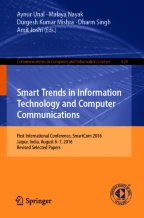Abstract
Recommendation systems have been successfully used by e-commerce and other similar sites for recommendation of relevant items to the user. However majority of these systems are based on web usage mining which does not consider the semantic knowledge underlying a website in the recommendation process and based solely on usage data. Hence researchers realized the importance of semantic knowledge and began to use it as part of usage data which is primarily used by personalization systems to enhance the quality of items being recommended. However several issues emerged during the process of integration. For effective personalization these issues need to be addressed. We discuss this aspect of integration process and also suggest some of the ways to resolve these issues and also discuss few methods of representing domain knowledge under different situations.
Similar content being viewed by others
References
Claypool, M., Gokhale, A., Miranda, T., Murnikov, P., Netes, D., Sartin, M.: Combining content-base and collaborative filters in an online newspaper. In: ACM SIGIR Workshop on Recommender Systems: Algorithms and Evaluation, California (1999)
Dai, H., Mobasher, B.: Integrating semantic knowledge with web usage mining for personalization. School of Computer Science, Telecommunication, and Information Systems (2007)
Burkhardt, H., Smith, B.: Handbook of Metaphysics and Ontology, pp. 640–647. Philosophia Verlag, Munich (1991)
Wiederhold, G.: Intelligent integration of information. In: SIGMOD, pp. 434–437 (1993)
Abecker, A., Bernardi, A., Sintek, M.: Proactive knowledge delivery for enterprise knowledge management. In: 11th Conference on Software Engineering, Germany, pp. 17–19 (1999)
Schnurr, H.P., Staab, S.: A proactive inferencing agent for desk support. In: AAAI Symposium on Bringing Knowledge to Business Processes, Technical report, Germany (2000)
Zouaq, A., Nikambou, R.: A survey of domain ontology engineering: methods and tools. In: Nkambou, R., Bourdeau, J., Mizoguchi, R. (eds.) Advances in Intelligent Tutoring Systems. SCI, vol. 308, pp. 103–119. Springer, Heidelberg (2010). doi:10.1007/978-3-642-14363-2_6
Horrocks, I., Sattler, U.: Ontology reasoning in the SHOQ(D) description logic. In: 17th International Joint Conference on Artificial Intelligence, Seattle (2001)
Craven, M., DiPasquo, D., Freitag, D., McCallum, A., Mitchell, T., Nigam, K., Slattery, S.: Learning to construct knowledge base from the world wide web. Artif. Intell. 118, 69–113 (2000)
Han, J., Fu, Y.: Discovery of multiple-level association rules from large databases. In: Very Large Data Bases, Switzerland, pp. 420–431 (1995)
Mobasher, B., Dai, H., Luo, T., Nakagawa, M.: Discovery and evaluation of aggregate usage profiles for web personalization. Data Min. Knowl. Discov. 6, 61–82 (2002). Kluwer Academic Publishers
Resnick, P., Iacovou, N., Suchack, M., Bergstrom, P., Riedl, J.T.: Grouplense: an open architecture for collaborative filtering of netnews. In: Proceeding of the ACM Conference on Computer Supported Cooperative Work, pp. 175–186 (1994)
Gruber, T.R.: A translation approach to portable ontologies. J. Knowl. Acquisition 5(2), 199–220 (1993)
Dai, H., Mobasher, B.: Using ontologies to discover domain-level web usage profiles. In: Proceedings of the 2nd Semantic Web Mining Workshop at ECML/PKDD, Helsinki, Finland (2002)
Author information
Authors and Affiliations
Corresponding author
Editor information
Editors and Affiliations
Rights and permissions
Copyright information
© 2016 Springer Nature Singapore Pte Ltd.
About this paper
Cite this paper
Dwivedi, S.K., Rawat, B. (2016). Issues and Requirements for Successful Integration of Semantic Knowledge in Web Usage Mining for Effective Personalization. In: Unal, A., Nayak, M., Mishra, D.K., Singh, D., Joshi, A. (eds) Smart Trends in Information Technology and Computer Communications. SmartCom 2016. Communications in Computer and Information Science, vol 628. Springer, Singapore. https://doi.org/10.1007/978-981-10-3433-6_12
Download citation
DOI: https://doi.org/10.1007/978-981-10-3433-6_12
Published:
Publisher Name: Springer, Singapore
Print ISBN: 978-981-10-3432-9
Online ISBN: 978-981-10-3433-6
eBook Packages: Computer ScienceComputer Science (R0)
